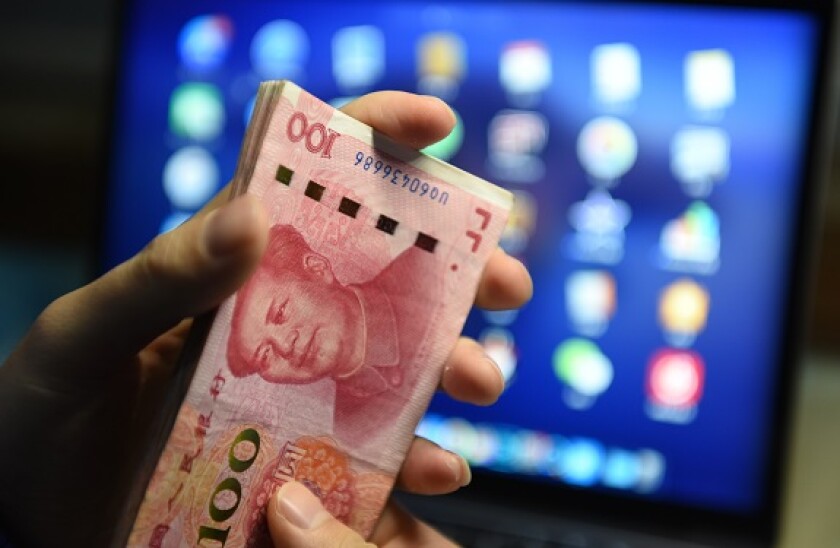Chinese banks and other financial institutions were asked to forgo Rmb1.5tr in profits this year to support the real economy. According to a State Council briefing at the end of last week, they held back Rmb1.25tr in profits by the end of October. This was achieved through a combination of measures including lowering interest rates and service fees, extending loan payments and repayments, and providing inclusive small and micro loans, deputy central bank governor Liu Guoqiang said.
At the same briefing, a senior official at the China Banking and Insurance Regulatory Commission (CBIRC) said that banks and insurers had invested in Rmb8tr of new bonds in the first three quarters of 2020. Loans to private companies increased by Rmb5.4tr, and by Rmb2tr to the manufacturing industry.
China’s shadow banking sector has shrunk by Rmb20tr from its peak, said chief counsel at the CBIRC, Liu Fushou. The country’s crackdown on the peer-to-peer (P2P) lending industry has seen the number of these platforms plunge to just three from 5,000 at the peak. The number of people borrowing from P2P platforms and the amount borrowed have dropped for 28 consecutive months, Liu said.
*
China’s exports grew 11.4% year-on-year to $237.2bn in October, with imports increasing 4.7% to $178.7bn.
*
The country’s foreign exchange reserves stood at $3.128tr at the end of October, after a decrease of $14.58bn — or 0.46% — from the previous month, showed data from the State Administration of Foreign Exchange (Safe).
China recorded a current account surplus of $94.2bn for the third quarter. The current account surplus for the first three quarters combined was $170.7bn, or 1.7% of GDP.
For the quarter ended September 30, outbound direct investment reached $33.2bn, with foreign direct investment in China topping $57.1bn. Foreign investment in the Chinese securities market exceeded $70bn, while over $30bn of Chinese investment was made in overseas securities, Safe data showed.
*
The People’s Bank of China (PBoC) has published the 2020 China Financial Stability Report. External pressure facing the country’s financial system has significantly increased, the report said, emphasising future risk-prevention work on curbing default risks at large Chinese companies.
To prevent default risks, the central bank proposed deepening corporate reforms and accelerating asset disposals at companies that have tight liquidity. Bad debt managers are being encouraged to buy more non-performing assets. In addition, the mechanisms dealing with corporate defaults as well as bankruptcy-related legal frameworks currently in place need to be perfected, the PBoC said.
The PBoC is encouraging banks, particularly medium and small-sized banks, to continue issuing perpetual bonds to raise capital. The PBoC said it will keep conducting central bank bill swaps to increase liquidity in the perp market.
The report also flagged challenges faced by Chinese insurers and the rising risks at trust companies.
*
In the report, the PBoC also disclosed the result of its most recent bank stress test to gauge the financial system’s resilience under “extreme but plausible” macroeconomic impact.
Twenty one of the 1,550 banks tested failed in the “severe” scenario of the stress test. In the “moderate” and “mild” scenarios, 13 and 10 banks did not pass, showed the report. The total number of banks tested grew from 2019’s 1,171.
*
China is planning to better support consumer finance and auto finance companies. A notice by the banking and insurance regulator said these companies can apply to local CBIRC branches to lower the provision coverage ratio requirement to 130% from the current 150%. They will also be allowed to issue tier two capital bonds in the interbank market.
*
The CSRC chairman Yi Huiman met with Carrie Lam, chief executive of the Hong Kong Special Administrative Region, last Thursday. The two agreed to further deepen connectivity between the capital markets in the Mainland and in Hong Kong, and improve cross-border financial co-operation.
*
The Supreme People's Procuratorate, the top Chinese agency responsible for investigation and prosecution, said it approved the arrest of 102 individuals for securities and futures related crimes between January and September and prosecuted 98. The numbers were 15% and 27% higher year-on-year, respectively, it said at a Friday press conference held jointly with the CSRC.
*
The PBoC plans to issue central bank bills in Hong Kong on Thursday, splitting the issuance between Rmb10bn three month bills and Rmb15bn one year bills.
*
The government of Shenzhen published measures to improve the city’s business environment.
It will support qualified foreign financial institutions to set up securities or fund management companies in Shenzhen. Companies from Hong Kong and Macau will only need to register before starting operation in all areas that are not banned by the foreign investment negative list. The measures will take effect from January 1, 2021.
*
The Ministry of Commerce (Mofcom) has published a report on the import of services. It expects China’s total services imports to reach $2.5tr over the next five years, and to exceed $10tr in 15 years.
The Mofcom said it will speed up the opening up of sectors like information technology services, science and technology services, digital services, medical, education, and culture and entertainment. It plans to gradually relax foreign ownership restrictions in areas including value-added telecommunications services, business services and transportation.

